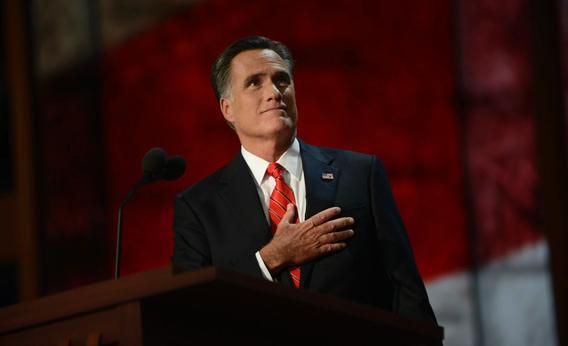Read the rest of Slate’s coverage from the GOP convention.
Mitt Romney had a lot of work to do Thursday night. The Republican nominee and convention headliner had to take the idea of his candidacy—something that has often failed to excite large audiences—and translate it into something appealing. His speech was one of his best chances to explain who he is as man, father, husband, and leader. The speech didn’t deliver any breakthroughs, but the idea managed to be pleasing enough for some people. Romney appeared assured, competent, kind, maybe even presidential.
The third Slate/SurveyMonkey snap survey—posted, as usual, at the end of Romney’s speech and held open until 9:30 Friday morning—took the temperature of voters across the country in the afterglow of the GOP’s three-day pep rally. (Information on respondents is available here. More information about SurveyMonkey Audience is here.) Results show that America may not be burning with Romney fever, but people are beginning to warm to the candidate.
We kicked off the insta-poll by asking: “Did Mitt Romney’s acceptance speech make you more likely or unlikely to vote for Mitt Romney and Paul Ryan in the upcoming election?” But instead of the usual apathy, we got a surprisingly positive response. The largest group of survey takers, 31.2 percent, said they were “much more likely” to support the Republican ticket after hearing Romney speak. When we added in those who chose “slightly more likely,” that favorable number rose to 43 percent. On the other hand, about 27 percent of respondents described themselves as less likely to vote Romney-Ryan in the wake of the speech, and 29.1 percent were unmoved in either direction.
Over at the Breakfast Table, John Dickerson summed up the prevailing wisdom about Romney’s address: It was perfectly respectable, reached at least a few listeners, and helped to humanize the candidate. Perhaps history won’t remember it as a turning point, but at least it smoothed over the debacle that was Clint Eastwood.
The second question was aimed at Romney’s running mate. We asked: “Vice presidential nominee Paul Ryan’s speech on Wednesday night of the RNC has been criticized by some media organizations for containing false or misleading information. Do you think that Ryan’s speech will harm Mitt Romney and Paul Ryan’s chances of winning the election in November?”
Incredibly, 45 percent of those surveyed didn’t think that a candidate delivering a speech littered with fibs would do any harm to Romney and Ryan’s chances. Maybe those surveyed don’t believe their fellow Americans will be able to discern fact from fiction. Or maybe they just think the average citizen doesn’t care what’s true. (By contrast, 27 percent of survey takers suspected the speech would hurt Romney-Ryan, and 28 percent weren’t sure.) In an article Tuesday on the Atlantic’s site, James Bennet imagined a world in which the electorate turned a deaf ear to the press as it continually pointed out lawmakers’ lies. Have our politics entered a post-factual age—can political campaigns no longer be shamed? If true, this race will get a lot uglier before it’s done.
